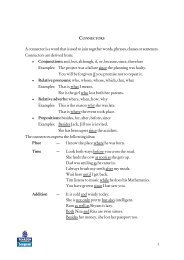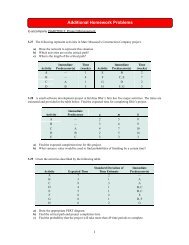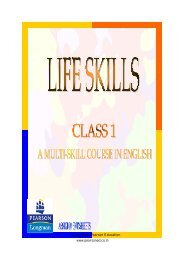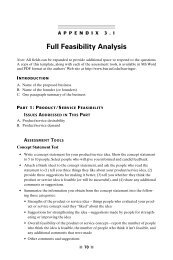class 7 - Pearson
class 7 - Pearson
class 7 - Pearson
Create successful ePaper yourself
Turn your PDF publications into a flip-book with our unique Google optimized e-Paper software.
www.pearsoned.co.in
RAIN IN SUMMER<br />
CLASS 7<br />
COMPREHENSION PASSAGE 1<br />
NAME ______________________________________<br />
DATE _________________<br />
How beautiful is the rain!<br />
After the dust and heat,<br />
In the broad and fiery street,<br />
In the narrow lane,<br />
How beautiful is the rain!<br />
How it clatters along the roofs,<br />
Like the tramp of hoofs;<br />
How it gushes and struggles out<br />
From the throat of the overflowing spout!<br />
Across the window-pane<br />
It pours and pours;<br />
And swift and wide,<br />
With a muddy tide,<br />
Like a river down the gutter roars<br />
The rain, the welcome rain!<br />
The sick man from his chamber looks<br />
At the twisted brooks;<br />
He can feel the cool<br />
Breath of each little pool;<br />
His fevered brain<br />
Grows calm again,<br />
And he breathes a blessing on the rain.<br />
From the neighbouring school<br />
Come the boys,<br />
With more than their wonted noise<br />
And commotion;<br />
And down the wet streets<br />
Sail their mimic fleets,<br />
Till the treacherous pool<br />
Engulfs them in its whirling<br />
And turbulent ocean.<br />
A. You have read an extract from the original poem. Find a book on Longfellow’s poems in your<br />
school library and read the complete poem.<br />
© copyright <strong>Pearson</strong> Education<br />
www.pearsoned.co.in<br />
2
RAIN IN SUMMER<br />
CLASS 7<br />
COMPREHENSION PASSAGE 1<br />
NAME ______________________________________<br />
DATE _________________<br />
B. Answer the following questions.<br />
1. Why, according to the poet, is the rain so welcome in summer?<br />
______________________________________________________________________<br />
______________________________________________________________________<br />
2. Which animal does the rain sound like when it clatters along the roofs?<br />
______________________________________________________________________<br />
______________________________________________________________________<br />
3. Pick out the lines from the poem that tell you that a heavy shower is being described.<br />
______________________________________________________________________<br />
______________________________________________________________________<br />
4. What effect does the rain have on the sick man?<br />
______________________________________________________________________<br />
______________________________________________________________________<br />
5. What is the school boys’ ‘mimic fleet’?<br />
______________________________________________________________________<br />
______________________________________________________________________<br />
C. Find the antonyms of these words, from the poem.<br />
1. Narrow ______________________<br />
2. Wide ______________________<br />
3. Clean ______________________<br />
4. Calm ______________________<br />
5. Safe ______________________<br />
6. Sow ______________________<br />
7. Curse ______________________<br />
8. Well ______________________<br />
9. Straight ______________________<br />
10. Ugly ______________________<br />
© copyright <strong>Pearson</strong> Education<br />
www.pearsoned.co.in<br />
3
RAIN IN SUMMER<br />
CLASS 7<br />
COMPREHENSION PASSAGE 1<br />
NAME ______________________________________<br />
DATE _________________<br />
D. Rain is beautiful, but sometimes, it can also cause problems. Imagine you are going back<br />
home in your car with your family one evening, and get caught in a thunderstorm. Describe<br />
what happens.<br />
_________________________________________________________________________<br />
_________________________________________________________________________<br />
_________________________________________________________________________<br />
_________________________________________________________________________<br />
_________________________________________________________________________<br />
_________________________________________________________________________<br />
_________________________________________________________________________<br />
_________________________________________________________________________<br />
_________________________________________________________________________<br />
_________________________________________________________________________<br />
_________________________________________________________________________<br />
_________________________________________________________________________<br />
_________________________________________________________________________<br />
_________________________________________________________________________<br />
_________________________________________________________________________<br />
_________________________________________________________________________<br />
_________________________________________________________________________<br />
_________________________________________________________________________<br />
_________________________________________________________________________<br />
_________________________________________________________________________<br />
_________________________________________________________________________<br />
_________________________________________________________________________<br />
_________________________________________________________________________<br />
_________________________________________________________________________<br />
_________________________________________________________________________<br />
© copyright <strong>Pearson</strong> Education<br />
www.pearsoned.co.in<br />
4
MY FAILED OMELETTES AND<br />
OTHER DISASTERS<br />
CLASS 7<br />
COMPREHENSION PASSAGE 2<br />
NAME ______________________________________<br />
DATE _________________<br />
In nearly fifty years of writing for a living, I have<br />
never succeeded in writing a best-seller. And now I<br />
know why. I can’t cook.<br />
Had I been able to do so, I could have turned out a<br />
few of those sumptuous looking cookery books that<br />
brighten up the bookstore windows before being<br />
snapped up by folks who can’t cook either. As it is, I<br />
were forced to write a cookbook, it would probably be<br />
called Fifty Ways of Boiling an Egg, and Other Disasters.<br />
I used to think that boiling an egg would be a simple undertaking. But when I came to live<br />
at 7,000 feet in the Himalayan foothills, I found that just getting the water to boil was<br />
something of an achievement. I don’t know if it’s the altitude or the density of the water,<br />
but it just won’t come to the boil in time for breakfast. As a result, my eggs are only halfboiled.<br />
“Never mind,” I tell everyone, “half-boiled egs are more nutritious than full-boiled<br />
eggs.”<br />
“Why boil them at all?” asks my five-year-old grandson, Gautam, who is my Mr. Dick,<br />
always offering good advice. “Raw eggs are probably healthier.”<br />
“Just you wait and see,” I told him, “I’ll make you a cheese omelette you’ll never forget.”<br />
and I did. It was a bit messy, as I was over-generous with the tomatoes, but I thought it<br />
tasted rather good. Gautam, however, pushed his plate away, saying, “You forgot to put<br />
in the egg.”<br />
101 Failed Omelettes might well be the title of my bestseller.<br />
I love watching other people cook—a habit that I acquired at a young age, when I would<br />
watch my Granny at work in the kitchen turning out delicious curries, koftas and custards.<br />
I would try helping her, but she soon put a stop to my feeble contributions. On one<br />
occasion, she asked me to add a cup of spices to a large curry dish she was preparing, and<br />
absent-mindedly, I added a cup of sugar. The result—a very sweet curry! Another invention<br />
of mine.<br />
I was better at remembering Granny’s kitchen proverbs. Here are some of them:<br />
‘There is skill in all things, even in making porridge.’<br />
‘Dry bread at home is better than curried prawns abroad.’<br />
‘Eating and drinking should not keep men from thinking.’<br />
‘Better a small fish than an empty dish.’<br />
© copyright <strong>Pearson</strong> Education<br />
www.pearsoned.co.in<br />
5
MY FAILED OMELETTES AND<br />
OTHER DISASTERS<br />
CLASS 7<br />
COMPREHENSION PASSAGE 2<br />
NAME ______________________________________<br />
DATE _________________<br />
And her favourite maxim, with which she reprimanded me<br />
whenever I showed signs of gluttony: ‘Don’t let your tongue<br />
cut your throat,’<br />
And as for making porridge, it’s certainly no simple matter. I<br />
made one or two attempts, but it always comes out lumpy.<br />
“What’s this?” asked Gautam suspiciously, when I offered<br />
him some.<br />
“Porridge!’ I said enthusiastically, “It’s eaten by those brave<br />
Scottish Highlanders who were always fighting the English!”<br />
“And did they win?” he asked.<br />
“Well—er—not usually. But they were outnumbered!”<br />
He looked doubtfully at the porridge. “Some other time,” he said.<br />
So why not take the advice of Thoreau and try to simplify life! Simplify! Simplify! Or simply<br />
sandwiches...<br />
These shouldn’t be too difficult, I decided. After all, they are basically bread and butter.<br />
But have you tried cutting bread into thin slices? Don’t. It’s highly dangerous. If you’re a<br />
pianist, you could be putting your career at great risk.<br />
You must get your bread ready-sliced. Butter it generously. Now add your fillings.<br />
Cheese, tomato, lettuce, cucumber, whatever. Gosh, I was really going places! Slap another<br />
slice of buttered bread over this assemblage. Now cut in two. Result: Everything spills out<br />
at the sides and on to the table-cloth.<br />
“Now look what you’ve gone and done,” says Gautam, in his best Oliver Hardy manner.<br />
“Never mind,” I tell him, “practice makes perfect!”<br />
And one of these days, you’re going to find Bond’s Book of Better Sandwiches up there on the<br />
bestseller lists.<br />
A. Now that you have read the chapter, talk about the humour in it.<br />
© copyright <strong>Pearson</strong> Education<br />
www.pearsoned.co.in<br />
6
MY FAILED OMELETTES AND<br />
OTHER DISASTERS<br />
CLASS 7<br />
COMPREHENSION PASSAGE 2<br />
NAME ______________________________________<br />
DATE _________________<br />
B. Match the words to their meanings.<br />
1. sumptuous<br />
2. snapped up<br />
3. simple undertaking<br />
4. achievement<br />
5. altitude<br />
6. density<br />
7. nutritious<br />
8. feeble contributions<br />
9. assemblage<br />
10. gluttony<br />
A. height<br />
B. easy task<br />
C. quantity of matter<br />
D. eating far too much<br />
E. weak efforts<br />
F. impressive, tasty and costly<br />
G. collection of articles<br />
H. healthy and nourishing<br />
I. something completed successfully<br />
J. quickly taken or bought<br />
C. Answer the following questions.<br />
1. What is a bestseller? Why do you think a cookbook is a bestseller?<br />
______________________________________________________________________<br />
______________________________________________________________________<br />
2. Why did the eggs, which the author made for breakfast, remain half-boiled?<br />
How did he console himself?<br />
______________________________________________________________________<br />
______________________________________________________________________<br />
3. Why did Gautam feel that the cheese omelette had no egg?<br />
______________________________________________________________________<br />
______________________________________________________________________<br />
4. What advice did he give his grandfather?<br />
______________________________________________________________________<br />
______________________________________________________________________<br />
5. What were the author’s granny’s kitchen proverbs? What do they mean?<br />
______________________________________________________________________<br />
______________________________________________________________________<br />
6. Why does the author say that a pianist’s career would be at risk if he tried to<br />
cut very thin slices of bread?<br />
______________________________________________________________________<br />
______________________________________________________________________<br />
7. Name some bestsellers that the author thinks he could write.<br />
______________________________________________________________________<br />
______________________________________________________________________<br />
© copyright <strong>Pearson</strong> Education<br />
www.pearsoned.co.in<br />
7
MY FAILED OMELETTES AND<br />
OTHER DISASTERS<br />
CLASS 7<br />
COMPREHENSION PASSAGE 2<br />
NAME ______________________________________<br />
DATE _________________<br />
D. Fill in the blanks with the correct forms of the appropriate phrasal verbs given in the brackets.<br />
BRUSH UP, GIVE UP, TURN UP, BLOW UP, SNAP UP<br />
1. The new car _________________________ in the middle of the road due to a<br />
technical problem.<br />
2. The best clothes were __________________________ by eager shoppers at the<br />
beginning of the sale.<br />
3. We thought he was not in town and were quite surprised when he<br />
_______________________ for dinner.<br />
4. Don’t __________________________ yet; keep trying hard and you may still<br />
succeed.<br />
5. He needs to _______________________ his typing skills if he wants a job in this<br />
office.<br />
E. Have you ever had adventures in the kitchen like the author? Write a diary entry abput one of<br />
them.<br />
_________________________________________________________________________<br />
_________________________________________________________________________<br />
_________________________________________________________________________<br />
_________________________________________________________________________<br />
_________________________________________________________________________<br />
_________________________________________________________________________<br />
_________________________________________________________________________<br />
_________________________________________________________________________<br />
_________________________________________________________________________<br />
_________________________________________________________________________<br />
_________________________________________________________________________<br />
_________________________________________________________________________<br />
_________________________________________________________________________<br />
_________________________________________________________________________<br />
_________________________________________________________________________<br />
_________________________________________________________________________<br />
_________________________________________________________________________<br />
_________________________________________________________________________<br />
© copyright <strong>Pearson</strong> Education<br />
www.pearsoned.co.in<br />
8
MY FAILED OMELETTES AND<br />
OTHER DISASTERS<br />
CLASS 7<br />
COMPREHENSION PASSAGE 2<br />
NAME ______________________________________<br />
DATE _________________<br />
F. You have invited ten friends for dinner. Three of them are vegetarians, and one is a vegan. He/<br />
She is a vegetarian who does not take any animal products. You have to explain this to one of your<br />
parents, and draw up an ideal menu to suit everybody. Write the conversation between you and<br />
your parent.<br />
_________________________________________________________________________<br />
_________________________________________________________________________<br />
_________________________________________________________________________<br />
_________________________________________________________________________<br />
_________________________________________________________________________<br />
_________________________________________________________________________<br />
_________________________________________________________________________<br />
_________________________________________________________________________<br />
_________________________________________________________________________<br />
_________________________________________________________________________<br />
_________________________________________________________________________<br />
_________________________________________________________________________<br />
_________________________________________________________________________<br />
_________________________________________________________________________<br />
_________________________________________________________________________<br />
_________________________________________________________________________<br />
_________________________________________________________________________<br />
_________________________________________________________________________<br />
_________________________________________________________________________<br />
_________________________________________________________________________<br />
_________________________________________________________________________<br />
_________________________________________________________________________<br />
_________________________________________________________________________<br />
_________________________________________________________________________<br />
© copyright <strong>Pearson</strong> Education<br />
www.pearsoned.co.in<br />
9
LAUGHING SONG<br />
CLASS 7<br />
COMPREHENSION PASSAGE 3<br />
NAME ______________________________________<br />
DATE _________________<br />
When the green woods laugh with the voice of joy,<br />
And the dimpling stream runs laughing by;<br />
When the air does laugh with our merry wit,<br />
And the green hills laughs with the noise of it;<br />
When the meadows laugh with lively green,<br />
And the grasshoppers laughs in the merry scene;<br />
When Mary and Susan and Emily<br />
With their sweet round mouths sing ‘Ha ha he!’<br />
When the painted birds laugh in the shade,<br />
Where our table with cherries and nuts is spread:<br />
Come live, and be merry, and join with me,<br />
To sing the sweet chorus of ‘Ha ha he!’<br />
A. Pick out words from the poem which mean the following:<br />
1. Forests _________________________________<br />
2. Making hollow spaces in the way _________________________________<br />
3. Ability to be funny and clever _________________________________<br />
4. Green fields _________________________________<br />
B. The mood of the poem is a happy one. Write a diary entry in about 100-150 words about the<br />
things that make you happy.<br />
________________________________________________________________________________<br />
________________________________________________________________________________<br />
________________________________________________________________________________<br />
________________________________________________________________________________<br />
________________________________________________________________________________<br />
________________________________________________________________________________<br />
________________________________________________________________________________<br />
________________________________________________________________________________<br />
________________________________________________________________________________<br />
________________________________________________________________________________<br />
________________________________________________________________________________<br />
________________________________________________________________________________<br />
________________________________________________________________________________<br />
________________________________________________________________________________<br />
________________________________________________________________________________<br />
© copyright <strong>Pearson</strong> Education<br />
www.pearsoned.co.in<br />
10
LAUGHING SONG<br />
CLASS 7<br />
COMPREHENSION PASSAGE 3<br />
NAME ______________________________________<br />
DATE _________________<br />
C. Answer these questions based on your reading of the poem.<br />
1. What do the green hill and the meadows do in the poem?<br />
______________________________________________________________________<br />
______________________________________________________________________<br />
2. Which words in the poem suggest joy?<br />
______________________________________________________________________<br />
______________________________________________________________________<br />
3. What are Mary, Emily and Susan doing?<br />
______________________________________________________________________<br />
______________________________________________________________________<br />
4. What does the poet want the readers to do?<br />
______________________________________________________________________<br />
______________________________________________________________________<br />
5. Do you think the mood of the poem is happy? Or is it sad? Give reasons for<br />
your answer.<br />
______________________________________________________________________<br />
______________________________________________________________________<br />
6. Explain the following phrases from the poem in your own words:<br />
i. dimpling streams:<br />
_______________________________________________________________<br />
_______________________________________________________________<br />
ii. Green hills laugh<br />
_______________________________________________________________<br />
_______________________________________________________________<br />
iii. Lively green<br />
_______________________________________________________________<br />
_______________________________________________________________<br />
iv. Painted birds<br />
_______________________________________________________________<br />
_______________________________________________________________<br />
D. Given below are the adverb forms of some words. Tick the correct spelling for each..<br />
1. merry<br />
2. sweet<br />
3. soft<br />
4. true<br />
5. clumsy<br />
6. gentle<br />
merrily<br />
sweetily<br />
softly<br />
truly<br />
clumsily<br />
gentley<br />
merrily<br />
sweetly<br />
softily<br />
truly<br />
clumsly<br />
gently<br />
There are different spelling rules<br />
being followed in the above exercise.<br />
After you have ticked the correct<br />
spelling, can you identify the<br />
different spelling rules followed?<br />
© copyright <strong>Pearson</strong> Education<br />
www.pearsoned.co.in<br />
11
LAUGHING SONG<br />
CLASS 7<br />
COMPREHENSION PASSAGE 3<br />
NAME ______________________________________<br />
DATE _________________<br />
E. Laughter a very important part of our lives. Write a short letter to your younger sister/<br />
brother highlighting this fact.<br />
_________________________________________________________________________<br />
_________________________________________________________________________<br />
_________________________________________________________________________<br />
_________________________________________________________________________<br />
_________________________________________________________________________<br />
_________________________________________________________________________<br />
_________________________________________________________________________<br />
_________________________________________________________________________<br />
_________________________________________________________________________<br />
_________________________________________________________________________<br />
_________________________________________________________________________<br />
_________________________________________________________________________<br />
_________________________________________________________________________<br />
_________________________________________________________________________<br />
_________________________________________________________________________<br />
_________________________________________________________________________<br />
_________________________________________________________________________<br />
_________________________________________________________________________<br />
_________________________________________________________________________<br />
_________________________________________________________________________<br />
_________________________________________________________________________<br />
_________________________________________________________________________<br />
_________________________________________________________________________<br />
_________________________________________________________________________<br />
© copyright <strong>Pearson</strong> Education<br />
www.pearsoned.co.in<br />
12
NATURE’S FURY: VOLCANOES<br />
CLASS 7<br />
COMPREHENSION PASSAGE 4<br />
NAME ______________________________________<br />
DATE _________________<br />
Imagine a mountain spitting out burning hot rocks, and lava trickling down along its<br />
sides—frightening, awe-inspiring nature at its wildest. That’s what a volcano is. Let us<br />
read more about this.<br />
The crust of the earth is composed of twelve major plates and a number of smaller plates.<br />
The plates keep rubbing against each other. They slide and push against one another and<br />
even pull apart from each other. When this happens, sometimes earthquakes and volcanoes<br />
occur. How does all this happen?<br />
In the core of the earth, there is a pool of melted rock. It is called magma. Due to the intense<br />
heat inside, magma expands and pushes against solid rock. It squeezes into cracks<br />
and a sit reaches the earth’s surface, it bursts out and that is a volcanic eruption.<br />
Magma also has extremely hot gases in it. When magma reaches the surface of the earth, it<br />
is called lava. Lava is a boiling, red-hot liquid. As it runs down the sides of the volcano, it<br />
cools down and solidifies. A volcano also spits our tephra, which is hardened magma. It<br />
either comes out in the form of rocks or tiny particles of volcanic ash. The largest pieces of<br />
tephra are known as volcanic bombs. These are dangerous as they may be large and very<br />
heavy. Volcanoes do not smell good as they give off gases, some of which are poisonous.<br />
Volcanoes that have erupted in the recent periods are called active volcanoes. One such<br />
volcano is Stromboli, which is called the ‘Lighthouse of the Mediterranean’. An extinct<br />
volcano is one that has not erupted for thousands of years. Edinburgh in Scotland is built<br />
around an extinct volcano. A dormant volcano is one which may have erupted only in the<br />
earlier periods of history but is inactive now. An example of this is the Paricutin in Mexico,<br />
which has not erupted since the early 1950s.<br />
© copyright <strong>Pearson</strong> Education<br />
www.pearsoned.co.in<br />
13
NATURE’S FURY: VOLCANOES<br />
CLASS 7<br />
COMPREHENSION PASSAGE 4<br />
NAME ______________________________________<br />
DATE _________________<br />
Earth is not the only planet which has volcanoes. Volcanoes are found on Venus and Mars,<br />
as well as on our moon and the moons of Jupiter. On the Earth, however, volcanoes are<br />
found on all the continents except Australia. Most volcanoes on Earth are found in an area<br />
appropriately named the Pacific Ocean. A number of volcanoes are also found near the<br />
Mediterranean and Caribbean seas.<br />
Volcanoes endanger the lives and properties of those living close to them, but volcanic ash<br />
is full of minerals that make the soil very fertile. A good example of this is the rich, mineral-filled<br />
soil of Bali, Indonesia. Thanks to this, three crops of rice may be grown here in a<br />
year. Volcanoes also bring to the surface precious metals such as gold and silver. Magma,<br />
when it cools over a long period of time, may also form diamonds.<br />
Much of the mystery surrounding volcanic eruptions has been unraveled by scientists and<br />
geologists. But an erupting volcano still remains an awe-inspiring sight.<br />
INTERESTING FACTS ABOUT SOME VOLCANOES<br />
1. Krakatau is a small volcanic island in the South Pacific Ocean. In 1883, this island<br />
erupted and amazingly the sound was heard 4800 km away, in islands of the Indian<br />
Ocean. Volcanic ash from this eruption hung in the air even in faraway London for two<br />
years!<br />
2. Mount Vesuvius in Italy erupted in AD 79. the cities of Pompeii and Herculaneum were<br />
buried under lava and volcanic ash which later hardened. The cities were discovered only<br />
in 1700s.<br />
3. El Popo,55 km from Mexico City, is the most dangerous volcano as it erupts on a daily<br />
basis. A major eruption could cause tremendous destruction as a population of millions<br />
living close by would be affected.<br />
4. The largest active Volcano is Mauna Lao in Hawaii. It is about 4 km above sea level and<br />
192 km wide.<br />
© copyright <strong>Pearson</strong> Education<br />
www.pearsoned.co.in<br />
14
NATURE’S FURY: VOLCANOES<br />
CLASS 7<br />
COMPREHENSION PASSAGE 4<br />
NAME ______________________________________<br />
DATE _________________<br />
A. Try to guess the meaning of these words as used in the passage. Pick out the closest meaning<br />
from the alternatives provided.<br />
1. awe-inspiring<br />
a. height b. wonder c. respectful fear<br />
2. intense<br />
a. extreme b. deep c. strong feeling<br />
3. eruption<br />
a. boil b. bursting out of lava and ash c. dramatic outbreak<br />
4. composed<br />
a. calm b. made up of c. made up<br />
5. dormant<br />
a. asleep b. temporarily inactive c. alive but not actively<br />
growing<br />
6. unravelled<br />
a. wrapped up b. to make clear c. written about<br />
B. Imagine that you are a journalist based at Ahmedabad. Write a short report of the earthquake<br />
that took place in Gujrat on 26 January 2001. you may collect information from magazines and the<br />
Internet.<br />
________________________________________________________________________________<br />
________________________________________________________________________________<br />
________________________________________________________________________________<br />
________________________________________________________________________________<br />
________________________________________________________________________________<br />
________________________________________________________________________________<br />
________________________________________________________________________________<br />
________________________________________________________________________________<br />
________________________________________________________________________________<br />
________________________________________________________________________________<br />
________________________________________________________________________________<br />
________________________________________________________________________________<br />
________________________________________________________________________________<br />
________________________________________________________________________________<br />
________________________________________________________________________________<br />
© copyright <strong>Pearson</strong> Education<br />
www.pearsoned.co.in<br />
15
NATURE’S FURY: VOLCANOES<br />
CLASS 7<br />
COMPREHENSION PASSAGE 4<br />
NAME ______________________________________<br />
DATE _________________<br />
C. Answer the following questions.<br />
1. Why is a volcano described as being ‘nature at its widest’?<br />
______________________________________________________________________<br />
______________________________________________________________________<br />
2. Why does a volcanic eruption take place?<br />
______________________________________________________________________<br />
______________________________________________________________________<br />
3. What is magma? When is it called ‘lava’?<br />
______________________________________________________________________<br />
______________________________________________________________________<br />
4. What is ‘tephra’?<br />
______________________________________________________________________<br />
______________________________________________________________________<br />
5. What are the following types of volcanoes? Give examples of each.<br />
a. Active volcanoes<br />
_______________________________________________________________<br />
_______________________________________________________________<br />
b. Dormant volcanoes<br />
_______________________________________________________________<br />
_______________________________________________________________<br />
c. Extinct volcanoes<br />
_______________________________________________________________<br />
_______________________________________________________________<br />
6. What is the ‘Ring of Fire’?<br />
______________________________________________________________________<br />
______________________________________________________________________<br />
D. As you already know, words may have different meanings. They may also be used as different<br />
parts of speech. Pick out words from the passage which have these meanings when used in a different<br />
context. One has been done for you.<br />
1. Hard outer part of a loaf of bread crust<br />
2. The centre of an apple _____________________<br />
3. We eat on it _____________________<br />
4. A rank in the army _____________________<br />
5. We wash our faces in these _____________________<br />
6. A modern form of music _____________________<br />
7. Come to the top _____________________<br />
8. Length X breadth _____________________<br />
9. A document with blank spaces to be<br />
filled in with necessary information<br />
_____________________<br />
© copyright <strong>Pearson</strong> Education<br />
www.pearsoned.co.in<br />
16
THE BLIND MEN AND THE ELEPHANT<br />
CLASS 7<br />
COMPREHENSION PASSAGE 5<br />
NAME ______________________________________<br />
DATE _________________<br />
It was six men of Indostan,<br />
To learning much inclined,<br />
Who went to see the elephant<br />
(Though all of them were blind),<br />
That each by observation<br />
Might satisfy his mind.<br />
The First approached the Elephant,<br />
And happening to fall<br />
Against his broad and sturdy side,<br />
At once began to bawl:<br />
“God bless me! But the elephant<br />
Is very like a wall.”<br />
The second, feeling of the tusk<br />
Cried, “Ho! What have we here<br />
So very round and smooth and sharp?<br />
To me ‘tis mighty clear<br />
This wonder of an Elephant<br />
Is very like a spear!”<br />
The third approached the animal,<br />
And happening to take<br />
The squirming trunk within his hands,<br />
Thus boldly up and spake:<br />
“I see,” quoth he, “the Elephant<br />
Is very like a snake!”<br />
The Fourth reached out his eager hand,<br />
And felt about the kee.<br />
“What most this wondrous beast is like<br />
Is mighty plain,” quoth he;<br />
“ ‘Tis clear enough, the Elephant<br />
Is very like a tree.”<br />
The Fifth who chanced to touch the ear,<br />
Said, “E’en the blindest man<br />
Can tell what this resembles most;<br />
Deny the fact who can,<br />
This marvel of an Elephant<br />
Is very like a fan!”<br />
© copyright <strong>Pearson</strong> Education<br />
www.pearsoned.co.in<br />
17
THE BLIND MEN AND THE ELEPHANT<br />
CLASS 7<br />
COMPREHENSION PASSAGE 5<br />
NAME ______________________________________<br />
DATE _________________<br />
The sixth no sooner had begun<br />
About the beast to grope,<br />
Than, seizing on the swinging tail<br />
That fell within his scope,<br />
“I see,” quoth he,<br />
“the Elephant is very like a rope!”<br />
And so these men of Indostan<br />
Disputed loud and long,<br />
Each in his own opinion<br />
Exceeding stiff and strong;<br />
Though each was partly in the right<br />
And all were in the wrong.<br />
A. Complete the table to find out what the elephant looked like to the blind men. The first one has<br />
been done for you.<br />
MAN FELT BELIEVED<br />
First man The side That it was like a wall<br />
B. Find words and phrases in the poem which mean the following:<br />
1. Interested in education _____________________<br />
2. Cry out loudly _____________________<br />
3. A weapon with a long shining blade _____________________<br />
4. Said _____________________<br />
5. Moving around all the time this way and that _____________________<br />
6. Without fear _____________________<br />
7. Holding onto _____________________<br />
8. Argued _____________________<br />
9. Not completely _____________________<br />
© copyright <strong>Pearson</strong> Education<br />
www.pearsoned.co.in<br />
18
THE BLIND MEN AND THE ELEPHANT<br />
CLASS 7<br />
COMPREHENSION PASSAGE 5<br />
NAME ______________________________________<br />
DATE _________________<br />
C. Play a game. Your teacher will place some objects on a tray covered with a cloth. Form two<br />
teams. Four members of each team will be blindfolded and asked to feel the objects and guess<br />
what they are. A scorekeeper can give points for each correct answer and the team with the<br />
highest score will win.<br />
D. Make pairs of sentences with the words in the box to show how they may be used in different<br />
ways. One has been done for you.<br />
TRUNK, PLAIN, FAIR, BAY, LIGHT, BARK<br />
1. The blind man took the squirming trunk of the elephant in his hands.<br />
He packed his clothes in his steel trunk.<br />
2. ______________________________________________________________________<br />
______________________________________________________________________<br />
3. ______________________________________________________________________<br />
______________________________________________________________________<br />
4. ______________________________________________________________________<br />
______________________________________________________________________<br />
5. ______________________________________________________________________<br />
______________________________________________________________________<br />
6. ______________________________________________________________________<br />
______________________________________________________________________<br />
© copyright <strong>Pearson</strong> Education<br />
www.pearsoned.co.in<br />
19
THE BLIND MEN AND THE ELEPHANT<br />
CLASS 7<br />
COMPREHENSION PASSAGE 5<br />
NAME ______________________________________<br />
DATE _________________<br />
E. The guessing game must have been quite interesting. Write a dairy entry about it when you<br />
reach home.<br />
Date ______________________<br />
Dear Dairy,<br />
Today it wasn’t a;; studies. We actually played a game in <strong>class</strong>. It was great fun…<br />
_________________________________________________________________________<br />
_________________________________________________________________________<br />
_________________________________________________________________________<br />
_________________________________________________________________________<br />
_________________________________________________________________________<br />
_________________________________________________________________________<br />
_________________________________________________________________________<br />
_________________________________________________________________________<br />
_________________________________________________________________________<br />
_________________________________________________________________________<br />
_________________________________________________________________________<br />
_________________________________________________________________________<br />
_________________________________________________________________________<br />
_________________________________________________________________________<br />
_________________________________________________________________________<br />
_________________________________________________________________________<br />
_________________________________________________________________________<br />
_________________________________________________________________________<br />
_________________________________________________________________________<br />
_________________________________________________________________________<br />
_________________________________________________________________________<br />
_________________________________________________________________________<br />
_________________________________________________________________________<br />
_________________________________________________________________________<br />
_________________________________________________________________________<br />
_________________________________________________________________________<br />
_________________________________________________________________________<br />
_________________________________________________________________________<br />
_________________________________________________________________________<br />
_________________________________________________________________________<br />
_________________________________________________________________________<br />
_________________________________________________________________________<br />
© copyright <strong>Pearson</strong> Education<br />
www.pearsoned.co.in<br />
20


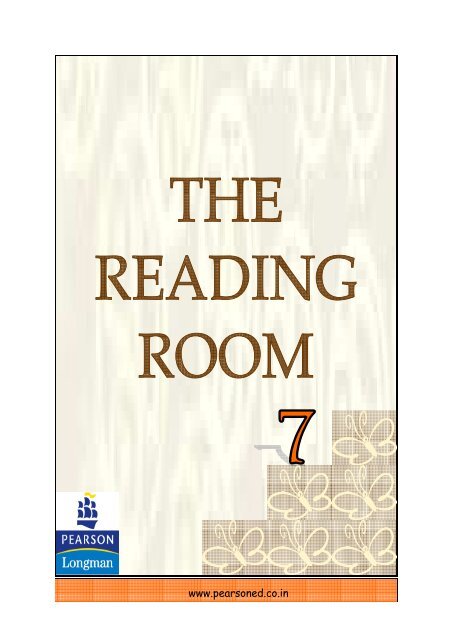
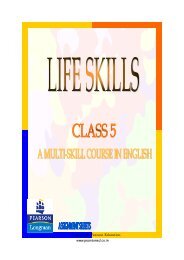
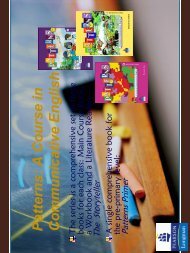
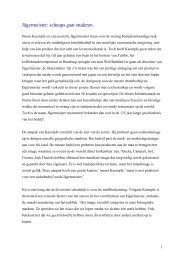
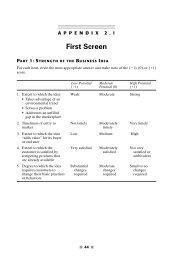
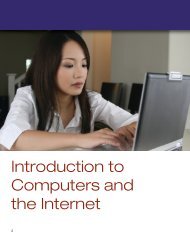



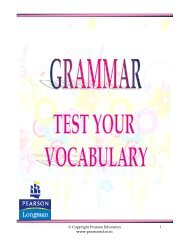
![[Productnaam] Marketingplan - Pearson](https://img.yumpu.com/26285712/1/190x132/productnaam-marketingplan-pearson.jpg?quality=85)
